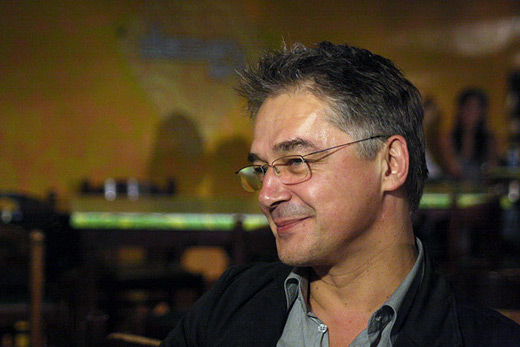
Paul Smaczny
Paul Smaczny studied law, French and German literature, film and theatre arts in Regensburg, Hamburg and Paris. After obtaining his Master’s degree, he began working as an assistant director and dramaturge for various productions in France. In 1986, he co-founded the theatre and film production company Le Grand Nuage de Magellan. From 1987 to 1989, he worked as a dramaturge for the Centre Dramatique National de Reims.
Since 1989 he is active as a film producer, director and screenwriter. In 1995 he was appointed Vice President and music production director of EuroArts Music International, and its Managing Director in 2001. He has produced or directed more than 200 films and television programs throughout the world, capturing some of the most important musical events of the last fifteen years, featuring such renowned orchestras and opera houses as the Staatsoper in Berlin, La Scala in Milan, the Salzburg Festival, the Berlin Philharmonic, the Orchestre du festival de Lucerne, the Vienna Philharmonic, and the Chicago Symphony Orchestra.
His film credits as a director include:
My Favourite Opera (series,1989-1991); The Grand Concert (1993); Wagner, Myth & Samurai (1993); the Opera Tales (series,1993-1994); Between School and Cantata (1995); The Silence that Follows the Music (1996); Christian Zacharias (1997); Entre Quatre-z-Yeux (1998); Maestros in Democracy (2000); Multiple Identities – Encounters with Daniel Barenboim (Special Jury Prize, Vienna TV Awards 2002); Lessons in Harmony (2003), Claudio Abbado – Entendre le silence (2003), Best Portrait Prize at the 22nd FIFA; Emotion and Analysis (2004); Knowledge Is the Beginning (2006)
Director’s Note
“Economics showed me that underdeveloped countries are only underdeveloped because they are underdeveloped. This tautology describes a poverty trap that is generated by poverty.
Our project can break through this vicious circle. It became increasingly clear to me that I couldn’t go only halfway with this; instead I saw that music could be a way out..”
Jose Antonio Abreu
In my work as film director, I try to look at political and social questions through the lens of music. I am fascinated by the power of music and all that it can accomplish in breaking down prejudice, evoking social change and bringing people together.
In Venezuela’s case, the world is looking at a project that’s taken on almost gigantic proportions. Hundreds of thousands of children and young adults from all social backgrounds are now making music together, educating each other, and taking responsibility for the shaping of their own futures. This achievement is for the most part the result of one man’s indefatigable commitment – Jose Antonio Abreu, the mastermind behind the project – who more than 30 years ago set himself the target of overcoming the imbalance in his country’s social relationships by way of musical education.
By conducting a long-term study of this project , it’s possible to feel out its scope and complexity, and above all to put it in the context of its social background.
Through this examination of El Sistema, I am trying to gain an understanding of contemporary Venezuelan society in all its complexity.
Through ‘El Sistema’, I am trying to understand contemporary Venezuelan society in all its complexity.

